- Home
- André Aciman
Eight White Nights Page 6
Eight White Nights Read online
Page 6
Was she real-world?
Was she others?
Did she worry I could be?
Or do Claras never worry about such things?
Because they know. Because they are the world, in the world, of the world. Because they’re here and now. Whereas I’m all over the place, whereas I’m nowhere, whereas I’m lifelike. Whereas I this, whereas I that.
Whereas I wanted to think of this as an encounter that had yet to gel, or hadn’t quite happened yet and was still being fleshed out by some celestial artificer who wasn’t getting his act together and hadn’t thought things through and would let us improvise our lines until a better craftsman took the matter in hand and let us have a second go at things.
I wanted to go back and imagine her as someone who hadn’t told me her name yet, or who’d already appeared to me, but the way people appear in dawn dreams before turning up for real the next day. Who knows, I might be given a second chance at all this. But on two conditions: that I end up at an entirely different party and that I forget I’d ever been to this one. Like someone coming back from a hypnotist or from a previous life, I’d meet new people, people I didn’t know I hadn’t met yet and couldn’t wait to meet, and almost wished I’d met instead, and would promise never ever to forget or live without until someone came out of nowhere and said something awkward by way of an introduction and reminded me of a woman I’d met once before, or crossed paths with but kept missing and was being reintroduced to at all costs now, because we had grown up together and lost touch, or been through so much, perhaps been lovers a lifetime ago, until something as trivial and stupid as death had come between us and which, this time, neither of us was about to let happen. Tell me your name is Clara. Are you Clara? Is your name Clara? Clara, she’d say, no, I’m not Clara.
“I love snow,” she finally said.
I stared at her without saying anything.
I was going to ask her why.
Then I thought of saying I envied people who could say they loved snow without feeling awkward or self-conscious, like writing poetry that rhymes. But that seemed unnecessarily fussy. I decided to look for something else to say.
And while I scrambled yet once more to fill the silence with something—anything—it hit me that if she could say she loved snow, it was probably because she too might have found the silence between us unbearable and decided it was more hackneyed to suppress a simple thought than to come right out with it.
“And I love it too,” I said, glad that she had paved the way for simplicity. “Though I don’t know why.”
“Though I don’t know why.”
Was she telling me, yet once more, that our minds ran along parallel lines? Or was she absentmindedly echoing or deriding a meaningless phrase I had thrown in to complicate what couldn’t have been simpler?
And yet I loved the way she had almost sighed, Though I don’t know why. I would have leaned toward her and put my arm around her waist. Did one lean toward Clara and put an arm around her waist and kiss her?
A few years ago I would have brought my lips to hers without hesitating.
Now, at twenty-eight, I wasn’t sure.
•
Someone pushed open the French window and entered the terrace.
“Found you,” he said. Then, as though having second thoughts: “Interrupting?” he asked, with what I suspected was a flicker of mischief in his eyes. “So this is where you’ve been hiding,” said the heavyset man as he leaned over and kissed Clara. “They said you weren’t here yet.”
“No, Rollo, just having me a smoke,” she said, altering her voice and affecting a swankier mode of speech, which I didn’t recognize. She motioned for him to shut the glass door. “Otherwise she kvetches.”
“Like you care,” he cracked.
“All I need now is to listen to Gretchen kvetching.”
“Why would Gretchen kvetch?” I inquired, less out of curiosity than to wedge into her lingo and keep the intimate halo of a while earlier.
“She hates it when I smoke and her baby is about. Tetchy Gretchy, born to kvetchy . . .”
“Where is the wench’s baby?” I asked, trying to sound roguish, especially since I hadn’t seen any children about. Gretchen-bashing was the party line in Clara’s world, and I wanted to show I was perfectly capable of dishing out some of my own, if this is what it took to join.
“Her baby was the asthmatic teenager who probably was kind enough to greet you when you arrived,” said the portly man, putting me squarely in place.
“The little ferret,” Clara added for my benefit.
“The little what?” he asked.
“Nuh-thing.”
The portly man put his arm around her shoulder as a sign he forgave her.
“Are you not freezing, Clariushka?”
“No.”
She turned to me. “Why, you be freezing?”
Was she forcibly inducting me into their world, or was this her way of establishing the pretense of a pre-existing friendship between us?
She wasn’t really waiting for an answer. I didn’t volunteer one. Instead, and as if by common agreement, all three of us rested our hands against the balustrade and looked over the limitless southern expanse of Manhattan’s white-purple skyline. “Just imagine,” Clara finally said, “if all the electric streetlamps on Riverside Drive reverted to their original gaslight jets, we might be able to turn off this century and pick another, any other. The Drive would look so mesmerizing on gaslit nights you’d think we were in another age.”
Spoken by the here-and-now party person who wasn’t a party person but was a party person, but wasn’t here-and-now and longed to be elsewhere in another age.
“Or any other city,” I threw in.
“Any city but this one, Clara, anywhere but. I’m so fed up with New York—” started Rollo.
“At the rate you’re going, you should be. Perhaps you should try slowing down and lying low for a while. Shouldn’t he lie low?” She suddenly turned to me. “It might do wonders for you. Look at us,” she said, as if we were an us, “we’re both lying very très low, and we’re the picture of bliss, aren’t we?”
“Clara lying low? Tell us another. Are you always faking, Clara?”
“Not tonight. This is exactly who I want to be tonight. And maybe, after all, this is exactly where I want to be—on this terrace, on the Upper West Side, on this side of the Atlantic. From up here you can see the entire universe with its infinitely small and petty humanoids striving to mingle body parts. From where I’m standing now, Rollo, you can see everything, including New Jersey.”
The fat man sniggered under his breath.
“That, for your nymphormation,” he said, turning his bulging eyes on me, “was an unwarranted jab at Gretchen—née Teaneck.”
“And right across starboard, letties and gentimen,” Clara went on, holding an imaginary mike in her hand in the manner of tour guides, “stands the pride of Teaneck’s skyline, Temple B’nai B’ris, and next to it Our Mother of Tuballigation.”
“All barbs tonight, aren’t we?”
“Oh, get a grip, Rollo—you’re starting to sound like a Shukoff.”
“Nasty is not lying low.”
“I said lying low, not comatose. Lying low as in rethinking things, and holding back, and dipping your toes in for a change instead of hurtling head-on into every hunk we fancy.”
There was an instant of silence.
“Touché, Clara, touché. I strayed into a valley of scorpions and stepped on the erectile tail of the meanest queen mother of them all.”
“I didn’t mean it like that, Rollo. You know exactly what I meant. I’m all bite, no venom—Winter,” she broke in, taking her last puff. “Don’t you just love winter and snow?”
It was not clear whether she was addressing me or him, or both, or neither, because there was something so dreamy and distant in the way she suddenly interrupted, and wanted us to know she was interrupting, that she might as well have been speaking to Manh
attan or to winter or to night itself or to the half-emptied glass of Bloody Mary standing on the ledge before her, which my father’s ghost had barely sipped from before withdrawing from the terrace. I wanted to think that she was speaking only to me, or to that part of me that remained as ductile as the snow crested on the balustrade and into which she had let her fingers sink.
Looking out and following the beam again, I couldn’t help myself. “I saw eternity the other night,” I finally said.
“I saw eternity the other night?”
Silence.
“Henry Vaughan,” I said, almost cringing with apology.
She seemed to search her mind awhile.
“Never heard of him.”
“Very few have,” I said.
And then I heard her say words that seemed to come back to me from at least a decade earlier:
I saw Eternity the other night,
Like a great ring of pure and endless light,
All calm, as it was bright . .
“Very few have?” She echoed my words with a look of mock-jubilation.
“Apparently more people than I thought,” I replied, trying to show that I took the lesson well, because I couldn’t have been happier.
“Courtesy of a Swiss lycée run by Madame Dalmedigo.” The putdown and the caress. And before I had time to say anything: “Oh, look!” And she pointed at the full moon. “Emfordimoon, stretfordamoon, good night moon, what you be doing there moon, here today, gaunt tomorrow, my moon, my everybody’s moon, good night moon, good night ladies, good night mooney-mooney.”
“El gibberish,” commented Rollo.
“El gibberish, yourselfish. Emfordimoon, misosouporsalad, moogoogaipan, merrichrima, merrichrima, I swoon, I swoon, by delightofda-moon.”
“And Merry Christmas to you too, New York,” I threw in.
“Actually,” she broke in, almost as though wanting to change the subject once again, “if anything, tonight reminds me of St. Petersburg.”
What had happened to the This is exactly where I want to be tonight party girl?
Had our minds been crisscrossing while traveling on parallel lanes all evening long? Or would anyone looking out of our terrace instantly think of St. Petersburg?
“And this is a white night—or almost?” I asked.
We spoke about the longest night of the year, and about the shortest, and how so many things, even when they’re turned inside out and retwined like a Möbius strip, always come out the same. We spoke about the man in Dostoevsky who meets a woman by an embankment and who for four white nights falls madly in love with her.
“A white night overlooking New Jersey? I don’t think so!” said Clara.
“A white night in winter? I don’t think so either!” retorted Rollo.
It made me laugh.
“Why are you laughing?” he asked, obviously annoyed by me.
“Dostoevsky in Fort Lee!” I replied, as though the matter needed no explanation.
“Why, is Dostoevsky on West 106th Street any better?” retorted Rollo.
“Can’t take a joke, can you, Rollo? But here’s the million-dollar question,” Clara continued. “Is it better to step out onto a terrace on Riverside Drive and look out onto New Jersey, or to be in New Jersey and make out the enchanted world of Upper West Side Jews celebrating Christmas?”
“Fungible Jews.”
“Runcible Jews.”
“Decibel Jews,” added Rollo.
“Amphibalent Jews,” she said.
I thought about her question, and all I could think of was a gaping New Jersey staring out at the Manhattan skyline asking the same question in reverse. Then I thought of Dostoevsky’s stranded lovers straining ever so wistfully to catch a glimpse of both Clara and me as we longed to alight on their gaslit Nevsky Prospekt. I didn’t know the answer to her question, would never know. All I said was that if those in Manhattan didn’t get to see Riverside Drive, those across the Hudson who did see the Drive wouldn’t get to be on it. The flip side of the flip side is no longer the flip side. Or is it? Haven’t we been speaking the same tongue, you and I? “It’s the same with love,” I threw in, not sure where exactly the parallel was headed, except that I felt emboldened to draw it. “One could dream of a relationship and one could be in one, but one can’t be the dreamer and the lover at the same time. Or can one, Clara?” She mused a moment as if she had grasped, if not the meaning of the analogy, at least its nudging, crafty drift.
“That’s a Door number three question, and I’m not doing those tonight.”
“Figures,” Rollo jabbed.
“Phooey,” she snapped back.
“You must be Rollo,” I finally interjected, trying to adopt the man-to-man camaraderie of a Stanley high-fiving Livingstone.
She remembered she hadn’t introduced us. He produced the beefy palm of a successful financier and, as he added, part-time cellist whose private life is an open closet.
“Phooey.” She sputtered one last whimpered salvo.
“Gorgon!” he shot back.
Not a Gorgon, I thought, but the witch Circe, who turned men into the domesticated pets they unavoidably become.
“Gorg,” he retorted under his breath, making an imitation dog bite, both of them enjoying these cat-and-mouse volleys.
Introductions were clearly not Clara’s forte. Rather, she skirted them by making it seem it was your fault you hadn’t shaken hands earlier. We should at least have had the courtesy to guess who the other was.
“A friend of Hans’s,” she explained. “Which reminds me: have you seen Hans?”
He shrugged his shoulders.
“Where’s Orla?”
“I’ve hardly seen anyone. I saw Beryl, she was with Inky in the blue room.”
“Inky is here?” interrupted Clara.
“I was just talking with him.”
“Well, I’m not.”
He looked at her as though he hadn’t understood. “What are you saying?”
Clara’s face assumed a look of impish sorrow designed to look purposely forged.
“Inky’s gone.” She turned away, studied the new cigarette she was about to light, and seemed to want to resume speaking of Dostoevsky’s “White Nights,” now that the news about Inky was settled. But Rollo was not to be easily distracted.
“I tell you he’s gone. Gone. As in gone, finito. As in out of the picture.”
The fat man looked totally flummoxed.
“Inky’s left me. Tu get it?”
“Je get it.”
“I’m just surprised he’s even here tonight, that’s all,” she said.
Rollo made an exasperated gesture with his arms.
“You two are just too much—too much,” he added.
“Actually, we were never much of anything. It was limbo and twilight from the get-go. Except that Rollo here, and everyone else we know, didn’t want to see it.” Again, unclear whether she was talking to me, New York, or herself.
“Did he know you were—in limbo and twilight, as you call it?”
There were bristles in his last words. I could also tell she was mulling something sharp.
“I was never—in limbo, Rollo.” It had now become a source of humor to mimic a dramatic pause before saying in limbo. “He was—in limbo. He was the great tundra of my life, if you care to know. It’s finished.”
“Poor, poor Inky. He should never have. First of all—”
“Furstible!”
“First of all you get him to throw everything he’s ever—”
“Furstible!”
“Clara, you’re worse than a Gorgon! First and foremost—”
“Furstible, runcible, fungible!”
Clara lifted both hands in a gesture signifying, I surrender and will say no more.
“It’s the cruelest thing I’ve heard all year.”
“What do you care. It frees him up for you. Isn’t that what you’ve always wanted?”
I didn’t know how long this was going to go on, but it
was getting uglier by the second.
“Will someone please tell me who’s Inky?” I finally barged in, like a child trying to break up a fight between his parents.
I didn’t mean to interrupt only. This was also a lame attempt to find out more about this beguiling world of theirs, where you come out on a terrace with a stranger and then, like a magician pulling an endless kerchief from someone’s else’s pocket, turn out to have a garland of numberless friends called Hans and Gretchen and Inky and Tito and Rollo and Beryl and Pablo and Mankiewicz and Orla and, on everyone’s lips, Clariushka, Clariushka, while you stood there and thought of Bellagio and Byzantium, of white nights, and of the cold waterways of St. Petersburg, which made the limitless black-and-white skyline of the Upper West Side look like a child’s fairy-tale book, where all you have to do is say the word and you’re in.
“Inky is from the trenches,” she explained, using our lingo, which flattered me and made me think I suddenly ranked higher than Rollo. Then she turned to him. “He did the right thing, you know. I can’t say I blame him. Though I did warn him.”
“Damn your warnings. The poor kid is in pieces. I know him. This is so hurtful.”
“Oh, sulky-pouty you, and sulky-pouty him—and it’s all so very hurtful.”
She did something that looked like a shrug, to make fun of his clumsy use of the word. “Clara, Clara—” he began, as though uncertain whether to plead and reason with her or curse her out, “you’re going to need to rethink . . .”
“Need, as we’re going to need to take our temperature this evening, and maybe need to watch our step or need to watch our diet, amigo? Don’t say anything. Say nothing, Rollo.” There was something suddenly indignant in her voice. What she meant, I could sense, was Say nothing you’ll regret. It was neither a rebuke nor a warning. It came like a slap in his face.
“Clara, if you don’t stop joking this minute, I promise I’ll never speak to you again.”

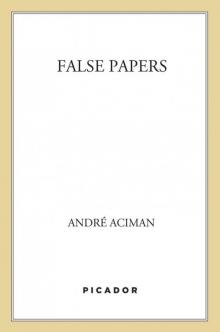 False Papers
False Papers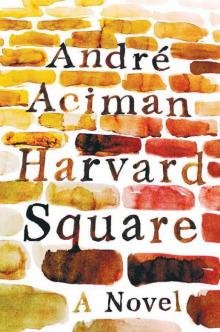 Harvard Square
Harvard Square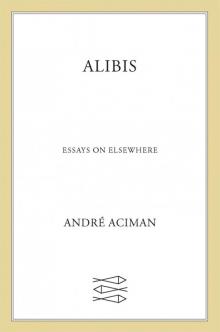 Alibis
Alibis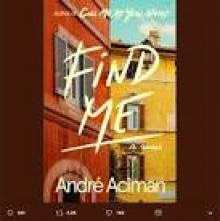 Find Me
Find Me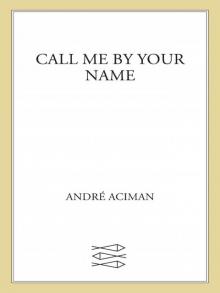 Call Me by Your Name
Call Me by Your Name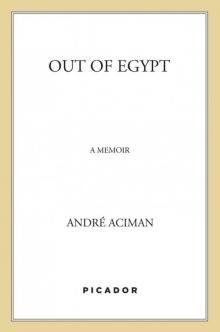 Out of Egypt: A Memoir
Out of Egypt: A Memoir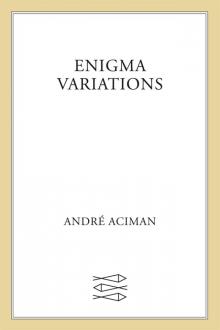 Enigma Variations
Enigma Variations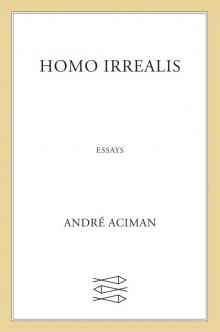 Homo Irrealis
Homo Irrealis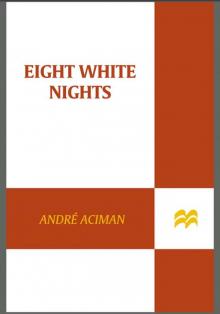 Eight White Nights
Eight White Nights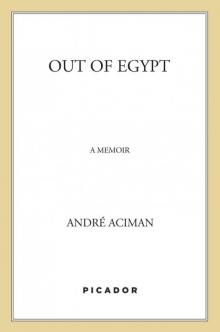 Out of Egypt
Out of Egypt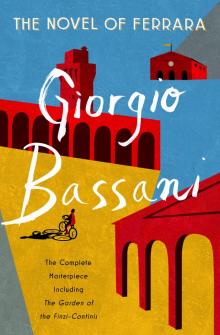 The Novel of Ferrara
The Novel of Ferrara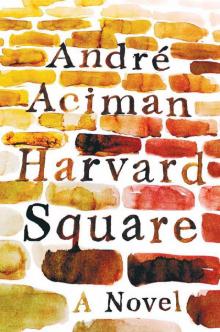 Harvard Square: A Novel
Harvard Square: A Novel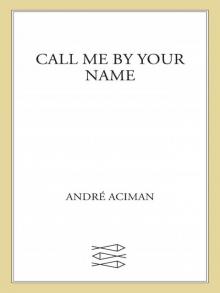 Call Me by Your Name: A Novel
Call Me by Your Name: A Novel